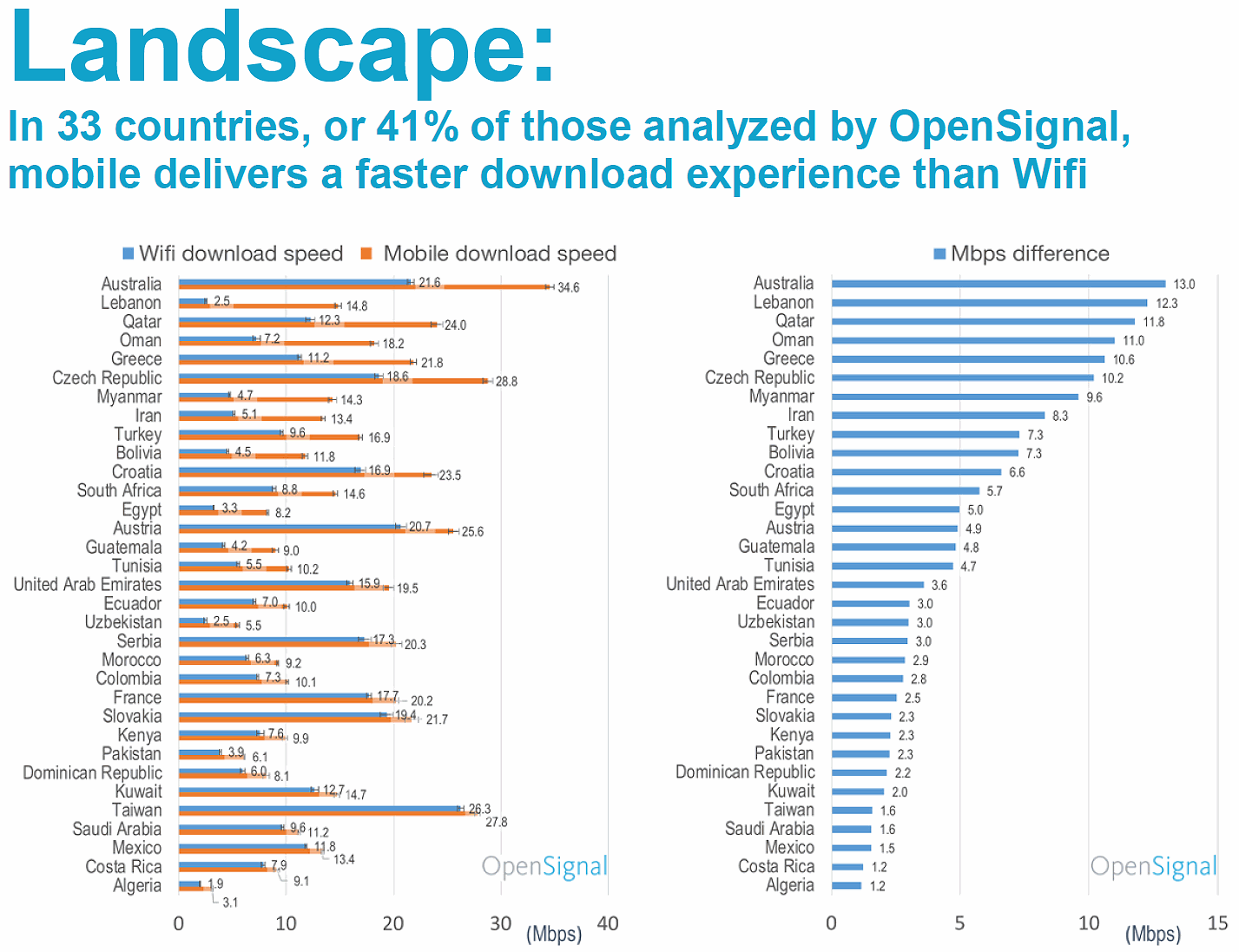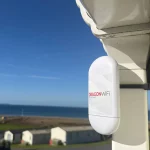Report – UK WiFi Download Speeds are Faster than Mobile Networks
A new report from OpenSignal, which uses crowd-sourced data to test 4G or 3G based Mobile Broadband network performance, has revealed that in 33 countries Smartphone users now experience faster average download speeds on a mobile network (4G / 3G) than via WiFi. But not in the United Kingdom, we’re the reverse.
Before we get started it’s worth pointing out that OpenSignal’s new report – ‘The State of Wifi vs Mobile Network Experience as 5G Arrives‘ (PDF) – doesn’t seem to make any distinction between the different types of WiFi network (e.g. free public / premium WiFi hotspots or home WiFi networks).
Most WiFi networks also depend on the quality of a home or office broadband line, thus if that fixed network performs poorly, then it will become a bottleneck for the WiFi too. But if you happen to have an “ultrafast broadband” ISP service then you’ve probably already found that the WiFi signal can still be a bigger bottleneck in some rooms of the house, not to mention any weaknesses in the connected devices.
Advertisement
On top of that there is no “speed reason” for Smartphones to switch network type (i.e. they don’t consider WiFi speed when automatically choosing a connection). When one type of network is faster, then users may choose to manually switch to that network type for the greater speed. But when the performance is similar on both WiFi and cellular, consumers have no reason to override their Smartphone’s automatic choice.
Overall OpenSignal’s global report is based off 63,223,150,678 measurements conducted via 7,788,215 unique devices (Smartphones with the app installed), which occurred between 5th August and 3rd November 2018. Obviously both mobile and WiFi signals are highly variable and change as you move around different environments.
Something else to note is that a lot of Smartphones do not work on 5GHz WiFi, which forces them to suffer the often slow and more congested 2.4GHz band. Suffice to say that the results of this study should probably be taken with a pinch of salt.
The Results
The range of countries where mobile proves faster vary widely from richer countries such as Australia, where the benefit of using mobile was greatest with speeds experienced by Smartphone users 13Mbps higher on mobile than Wi-Fi, and France (+2.5Mbps) to markets across every continent, for example: Qatar (+11.Mbps); Turkey (+7.3Mbps); Mexico (+1.5Mbps) and South Africa (+5.7Mbps).
Advertisement

However there are still quite a few countries where WiFi offers a faster speed, which the report suggests is due to most of those being underpinned by “relatively strong” fixed line broadband ISP networks. For example, the United Kingdom comes out as one of the fastest countries in this group with an average WiFi speed of 30.8Mbps vs 19Mbps for Mobile.
Other factors may also be at play here, such as the fact that some counties still rely on older and slower 3G mobile networks where WiFi may appear faster (assuming the fixed line infrastructure isn’t similarly weak).

Advertisement
The report suggests that future 5G mobile networks, which may be capable of multi-Gigabit speeds, could potentially change the balance. Mind you it’s worth remembering that fixed line networks and home routers are also improving, which makes it difficult to predict what will happen on this front.
The report concludes by making a number of recommendations for mobile operators.
Operators Must Re-evaluate their Wifi Assumptions
– Operators must become smarter with Wifi offload strategies. If not, they risk worsening aspects of their users’ experience, rather than improving it. There will be ongoing cost and capacity reasons for offload, but operators must take care on execution.
– Relying only on Wifi for indoor experience will not be viable. Consumers will increasingly override their smartphone’s automatic Wifi choice, and instead select cellular, to find the fastest download speed. If when they switch off Wifi they find the mobile experience to be poor, it will reduce satisfaction levels. Operators need to deliver good in-building mobile network coverage to be successful.
– Devices will connect to Wifi and mobile at once. Assumptions that users will connect to one network type at a time should be shelved, because smartphone designs will increasingly allow the use of both Wifi and mobile network technologies simultaneously to deliver the fastest data experience. Samsung already offers this feature on its flagship smartphones, and it will become a more common option.
Mark is a professional technology writer, IT consultant and computer engineer from Dorset (England), he also founded ISPreview in 1999 and enjoys analysing the latest telecoms and broadband developments. Find me on X (Twitter), Mastodon, Facebook, BlueSky, Threads.net and Linkedin.
« O2 UK Lays Groundwork for 5G with London Trial of Massive MIMO

















































Comments are closed